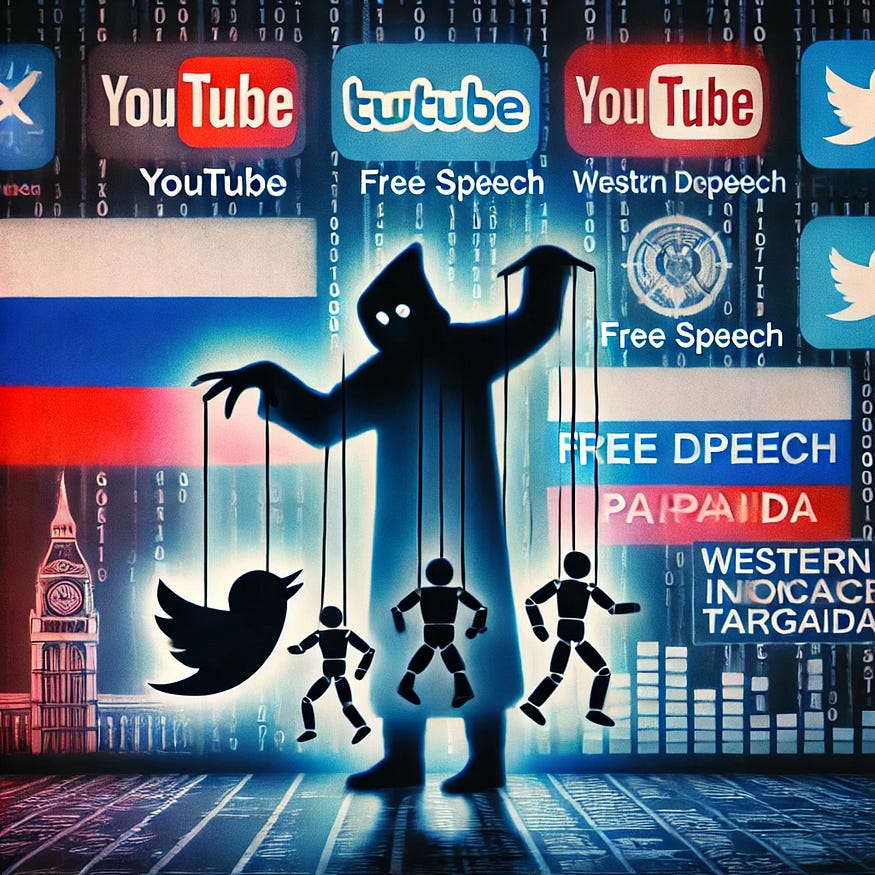The West Is Still Oblivious to Russia’s Information War
Paralyzed by Free Speech Concerns, Western Governments Struggle to Counteract Russian Propaganda.

In recent years, Russia has adeptly waged an information war against the West, exploiting the very freedoms that define democratic societies to spread propaganda and disinformation. Despite the glaring evidence of this ongoing battle, Western governments remain paralyzed by concerns over free speech, reluctant to take decisive action. This analysis delves into the intricacies of Russia’s information warfare tactics and the West’s faltering response.
A New Era of Propaganda
A few weeks ago, Russian President Vladimir Putin addressed millions of Western citizens in an unprecedented propaganda event. The medium for this outreach was an interview conducted by Tucker Carlson, viewed over 120 million times on platforms like YouTube and X (formerly Twitter). This event, while seemingly extraordinary, has become almost routine in the current landscape of information warfare.
1. The Reach of Propaganda:
Massive Viewership: The interview’s staggering viewership highlights the vast reach of Russian propaganda. It underscores how effectively the Kremlin can disseminate its narratives to a global audience, leveraging Western social media platforms.
Historical Revisionism: During the two-hour-long interview, Putin engaged in a tedious lecture on an imaginary Russian and Ukrainian history. This revisionist narrative is a cornerstone of Russian propaganda, aimed at justifying its actions and sowing confusion.
Weaponizing Social Media
Russia’s strategy in the information war heavily relies on social media, where the lines between free speech and propaganda blur. The Kremlin’s success in this arena is not merely a product of its efforts but also a result of Westerners unwittingly amplifying these messages.
1. Social Media as a Tool:
Platforms of Influence: Social media platforms like YouTube and X have become battlegrounds where Russian propaganda can thrive. These platforms, designed to maximize engagement, often prioritize sensational and divisive content, inadvertently boosting propaganda.
Western Complicity: By engaging with and sharing Russian content, Western users play a crucial role in spreading Kremlin narratives. This organic dissemination of propaganda makes it more difficult to counteract, as it appears as part of the regular discourse.
2. Challenges in Regulation:
Free Speech Concerns: Western governments are wary of regulating social media too strictly due to concerns over free speech. This hesitation creates a permissive environment for propaganda to flourish.
Tech Industry Resistance: Social media companies have been reluctant to implement stringent controls on content, citing the importance of free expression. Their business models, driven by ad revenue, also benefit from the high engagement that controversial content generates.
The West’s Paralysis
Despite the clear and present danger posed by Russian information warfare, Western governments have struggled to formulate an effective response. The emphasis on preserving free speech has led to a reactive rather than proactive stance, leaving the West vulnerable to manipulation.
1. Lack of Decisive Action:
Policy Gaps: There is a significant gap in policy when it comes to addressing foreign propaganda. Existing measures are often insufficient, outdated, or poorly enforced.
Inadequate Resources: Agencies tasked with countering disinformation are frequently underfunded and lack the resources needed to mount an effective defense.
2. Potential Solutions:
Enhanced Regulation: To combat propaganda effectively, there needs to be a balance between protecting free speech and preventing the spread of disinformation. This could involve targeted regulations that specifically address foreign influence operations.
Public Education: Increasing public awareness about the tactics used in information warfare can help individuals critically evaluate the content they encounter. Media literacy programs should be a priority to build a more resilient society.
International Cooperation: Combating information warfare requires a coordinated international effort. Sharing intelligence, best practices, and technological solutions can enhance the collective defense against propaganda.
Conclusion
The West’s ongoing struggle with Russia’s information warfare underscores the need for a more robust and proactive approach. While free speech is a cornerstone of democratic societies, it should not serve as a shield for malicious foreign influence. By enhancing regulations, increasing public awareness, and fostering international cooperation, the West can better defend itself against the insidious tactics of information warfare. It is imperative to recognize the gravity of this threat and act decisively to safeguard the integrity of democratic institutions and the truth.

